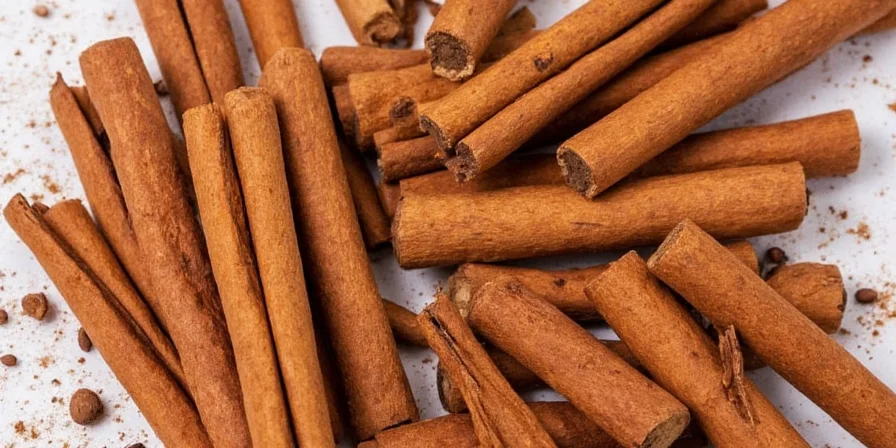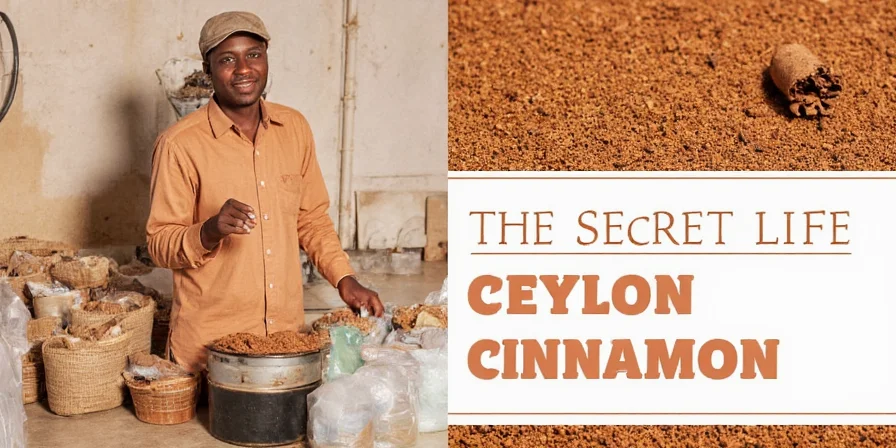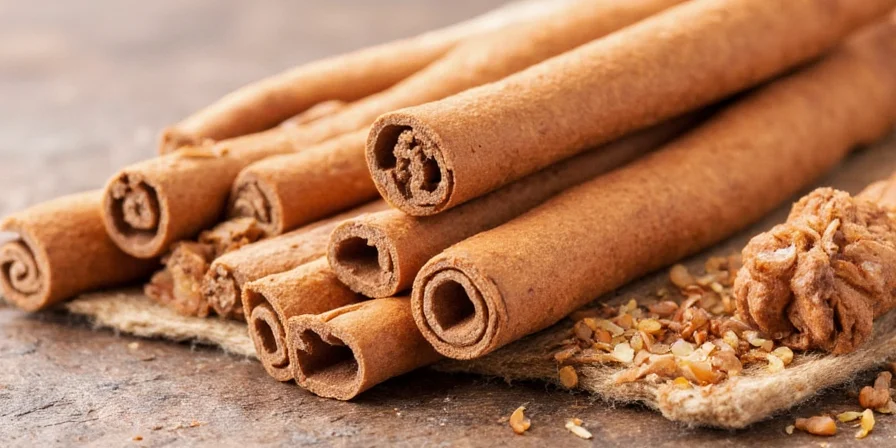The Hidden Power of Ceylon Cinnamon: A Flavor Lover’s Guide

Ceylon cinnamon, often referred to as 'true cinnamon,' is not just another spice on your shelf. It's a powerhouse of flavor and health benefits. In this blog, we’ll dive into the world of Ceylon cinnamon, exploring its unique qualities, how to store it like a pro, and some clever ways to use it in your kitchen. Whether you're a seasoned chef or a curious foodie, this guide is packed with tips, tricks, and scientific insights that will elevate your cooking game and your spice collection.
Understanding Ceylon Cinnamon: What Makes It Special
Ceylon cinnamon comes from the inner bark of the Cinnamomum verum tree, which is native to Sri Lanka. Unlike the more common Cassia cinnamon (from China and Southeast Asia), Ceylon cinnamon is delicate, aromatic, and has a more complex flavor profile. It’s often called 'true cinnamon' because of its superior quality and unique chemical composition, which includes compounds like cinnamaldehyde, eugenol, and coumarin.
Chemical Composition and Health Benefits
- Cinnamaldehyde: Responsible for the warm, sweet, and slightly spicy flavor of Ceylon cinnamon. It also has strong antioxidant and anti-inflammatory properties.
- Eugenol: A compound known for its antimicrobial and analgesic effects. It’s also used in aromatherapy and traditional medicine.
- Coumarin: Found in Ceylon cinnamon in much smaller quantities than in Cassia cinnamon. This compound is a natural blood thinner and has been linked to liver toxicity in high doses. However, because of its low levels in Ceylon cinnamon, it's generally considered safe for regular consumption.
These compounds not only give Ceylon cinnamon its unique flavor but also contribute to its health benefits, which include improving blood sugar levels, boosting brain function, and reducing the risk of heart disease. However, it's important to note that while Ceylon cinnamon is safe for regular use, it's best to consume it in moderation, especially if you're on blood-thinning medications.
Pro Tips for Storing Ceylon Cinnamon: Keep It Fresh and Flavorful
Proper storage is key to preserving the flavor and aroma of Ceylon cinnamon. Here are some pro tips to help you keep your cinnamon in top condition:
1. Store in an Airtight Container
Cinnamon is highly sensitive to moisture and air. To prevent it from losing its potency and flavor, store it in an airtight container. Glass jars with tight-fitting lids are ideal. Avoid using plastic containers, as they can absorb odors and affect the taste of the spice.
2. Keep It in a Cool, Dark Place
Heat and light can cause spices to degrade over time. Store your Ceylon cinnamon in a cool, dark place, such as a pantry or a spice cabinet. Avoid storing it in the refrigerator or freezer unless you're planning to use it in a very short period of time. Freezing can cause the spice to lose its aroma and become more brittle.
3. Avoid Moisture at All Costs
Moisture is the number one enemy of spices. Even a small amount of humidity can cause cinnamon to clump, lose its flavor, and become a breeding ground for mold. Make sure your storage area is dry and well-ventilated.
4. Buy in Small Quantities
Ceylon cinnamon is a spice that loses its potency over time. To ensure that you're always using the freshest cinnamon, buy it in small quantities and use it within a few months. If you purchase in bulk, consider dividing it into smaller containers and labeling them with the date of purchase.
5. Keep It Away from Strong Odors
Cinnamon is highly absorbent and can easily pick up strong odors from other spices or food items. Store it separately from other spices and away from any strong-smelling items like onions, garlic, or coffee.
By following these tips, you can ensure that your Ceylon cinnamon stays fresh, flavorful, and ready to use for months, if not years.
Maximizing Flavor: Clever Ways to Use Ceylon Cinnamon in the Kitchen
Ceylon cinnamon is a versatile spice that can be used in both sweet and savory dishes. Here are some clever ways to use it in your cooking:
1. In Baking: A Flavor Boost for Desserts
Ceylon cinnamon is a staple in many baked goods, including cakes, cookies, and pies. Its warm, sweet, and slightly spicy flavor pairs beautifully with chocolate, nuts, and dried fruits. When using cinnamon in baking, it's best to use it in small amounts, as the flavor can become overpowering if used in excess.
2. In Beverages: A Warm and Comforting Addition
Ceylon cinnamon is a popular ingredient in hot beverages like chai, coffee, and mulled wine. It adds a warm, spicy note that complements the other flavors in the drink. You can also add a pinch of cinnamon to your morning coffee or tea for a quick and easy flavor boost.
3. In Savory Dishes: A Secret Weapon for Flavor
While Ceylon cinnamon is often associated with sweet dishes, it can also be used in savory recipes. It pairs well with meats like lamb, chicken, and even fish. It also works well with vegetables like carrots, beets, and sweet potatoes. When using cinnamon in savory dishes, it's best to use it in small amounts and balance it with other spices like cumin, coriander, and turmeric.
4. In Sauces and Marinades: Enhancing Flavor and Aroma
Ceylon cinnamon can be used to add depth and complexity to sauces and marinades. It works well with tomato-based sauces, fruit-based marinades, and even yogurt-based dressings. When using cinnamon in sauces, it's best to add it early in the cooking process to allow the flavors to meld together.
5. In Spiced Nuts and Trail Mix: A Healthy and Delicious Snack
Ceylon cinnamon is a great addition to spiced nuts and trail mix. It adds a warm, sweet, and slightly spicy flavor that complements the other ingredients. You can also use it to make your own homemade cinnamon candies or gummies for a fun and healthy snack.
By using Ceylon cinnamon in these ways, you can unlock its full flavor potential and enjoy it in a variety of different dishes and recipes.
Comparing Ceylon Cinnamon with Cassia Cinnamon: A Flavor and Health Showdown
While Ceylon cinnamon is often considered the superior choice, it's important to understand the differences between Ceylon and Cassia cinnamon. Here's a quick comparison of the two:
| Characteristic | Ceylon Cinnamon | Cassia Cinnamon |
|---|---|---|
| Origin | Sri Lanka | China, Indonesia |
| Flavor | Delicate, sweet, and slightly spicy | Strong, bitter, and more intense |
| Color | Light brown, with a soft, flaky texture | Dark brown, with a hard, thick texture |
| Health Benefits | Rich in antioxidants, anti-inflammatory compounds, and coumarin in small amounts | High in coumarin, which can be toxic in large amounts |
| Usage | Best for baking, desserts, and beverages | More commonly used in savory dishes and spice blends |
As you can see, Ceylon cinnamon is a much more delicate and flavorful spice than Cassia cinnamon, and it’s also much safer for regular consumption. If you're looking for a high-quality cinnamon with superior flavor and health benefits, Ceylon is definitely the way to go.
Conclusion: Elevate Your Cooking with Ceylon Cinnamon
Ceylon cinnamon is more than just a spice—it's a flavor enhancer, a health booster, and a culinary treasure. By storing it properly and using it creatively in your cooking, you can unlock its full potential and enjoy its unique flavor in every dish. Whether you're baking a batch of cookies, making a savory stew, or sipping on a warm cup of tea, Ceylon cinnamon is sure to impress your taste buds and leave you craving more.
So go ahead, stock up on Ceylon cinnamon, and start experimenting with this amazing spice. Your kitchen—and your health—will thank you.

Whether you're a baking enthusiast or a health-conscious foodie, Ceylon cinnamon has something to offer everyone. With the right storage and usage techniques, you can make the most of this incredible spice and enjoy its full flavor and benefits.
Frequently Asked Questions (FAQs)
1. Can I use Ceylon cinnamon in savory dishes?
Yes! Ceylon cinnamon can be used in savory dishes like roasted vegetables, meat marinades, and even curries. It adds a warm, sweet, and slightly spicy flavor that complements many ingredients.
2. How much Ceylon cinnamon should I use in a recipe?
Ceylon cinnamon is a strong spice, so it's best to use it in small amounts. A pinch or a teaspoon is usually enough for most recipes. Start with a little and adjust to taste.
3. Is Ceylon cinnamon safe for people with diabetes?
Studies have shown that Ceylon cinnamon may help improve blood sugar levels and insulin sensitivity. However, it's important to consult with a healthcare professional before making any changes to your diet, especially if you're on medication.
4. How long does Ceylon cinnamon last?
Ceylon cinnamon can last for up to two years if stored properly in an airtight container in a cool, dark place. However, its flavor and potency will begin to decline over time, so it's best to use it within six months for the best results.
5. Can I use Ceylon cinnamon in beverages like coffee or tea?
Yes! Ceylon cinnamon is a popular addition to hot beverages like coffee, tea, and chai. It adds a warm, spicy flavor that enhances the overall taste of the drink.
With these FAQs and the tips and tricks covered in this blog, you're now well-equipped to make the most of Ceylon cinnamon in your kitchen. Whether you're a professional chef or a home cook, this spice is sure to become a staple in your spice collection.

So next time you're in the kitchen, reach for that jar of Ceylon cinnamon and let its rich aroma and flavor take your dishes to the next level. Happy cooking!










 浙公网安备
33010002000092号
浙公网安备
33010002000092号 浙B2-20120091-4
浙B2-20120091-4